Does your furry friend always seem to have an insatiable hunger and continually ask you for food? While it can be tempting to share everything you eat with Fido, it is essential to know what you should look for in puppy treats. If you want something healthy and safe, there are many vegetables for dogs that you can choose from.
Besides being rich in minerals and vitamins, non-starchy vegetables are also low in calories and fat content while providing fiber, which can promote healthy digestion for canines.
Like other food items, you must observe the best vegetables’ right portion size for a canine.
Keep the veggie treats in small portions and discuss with your vet about the necessary adjustments for your pet’s meals if you are supplementing with vegetables good for dogs to his diet. Keep in mind that vegetables with low calories don’t mean that they have zero calories. Likewise, you also have to ensure that your pet will not choke on the veggies in their excitement.
20 Dog-Friendly Vegetables
1. Carrots

Chewing crunchy and raw carrots can ease anxiety and clean your pet’s teeth. Adding carrots to your pet’s meal is good for his eyesight, and it can boost his immune system through antioxidants. Carrots are also excellent sources of vitamin A, C, K, and potassium.
Some dogs find it difficult to chew carrots and can choke on them. If there are undigested pieces of carrots in the stool, you can chop it into smaller sizes and then serve it cooked to avoid choking. Likewise, you can give one serving of pureed carrot to canines only every two days or so. You may serve one or two bite-size pieces too. To serve, make sure to remove the ends and wash the veggie thoroughly. Cut this into bite-sized treats, then cook in a pot of boiling water for around 10 minutes or steam this for 2 to 6 minutes until tender.
2. Broccoli

The stalks of broccoli help boost immunity, fight off arthritic inflammation, and ward off canine cancer. Chewing on the stalks of this vegetable also creates a natural toothbrush that fights plaque. It is also an excellent source of vitamins C, K, A, manganese, fiber, and folate. Just take note that too much broccoli, particularly the heads, might upset your pet’s digestive system and lead to significant gas issues.
This vegetable must only make up less than 5% of your canine’s food intake. To prepare, cut the broccoli into tiny florets, then wash thoroughly. Place the florets in an open vegetable steamer in the pot with boiling water, then cover with the use of your stove. You can steam this for 6-8 minutes until crisp but bright green and tender. You can microwave this by placing 2 cups of florets in the microwave-safe container with one inch of water for around 5 minutes.
3. Cucumber

Cucumbers are a refreshing treat for both humans and dogs. It contains 96% water; thus, it is an excellent way to hydrate and munch on a crunchy treat on a hot day. It also has lots of vitamins C, potassium, Vitamin K, and magnesium, which are also essential for a dog’s diet.
This vegetable is best served fresh to enjoy most of its nutritional benefits. Keep your pooch away from pickled cucumbers as these products often contain ingredients that are not suitable for canines.
You can combine peeled and chopped cucumbers with stalks of celery, pear, and cantaloupe for a refreshing canine-friendly salad. Small pieces of this can also be given as low-calorie training treats. Frozen chunks or spears can also serve as a soothing teething treat for your puppy.
4. Cauliflower

This vegetable is a hit among people who are trying to lose weight. It is healthy, and you can have your fill without worrying about extra calories. In the same way, cauliflower is one of the best veggies for dogs. It provides fiber, Vitamin C, potassium, calcium, and folate. These vitamins and nutrients are essential in keeping your dog’s blood, vision, muscles, liver, immune system, and others well-supported. Likewise, the fiber in this vegetable helps maintain a good weight, healthier color, and digestion.
Similar to other vegetables, you should not give too many cauliflowers in a single feeding. It can lead to gas and other digestive problems. Ideally, you can provide one to two florets served mashed, as a treat or finely chopped and topped on their regular meals.
5. Brussels Sprouts
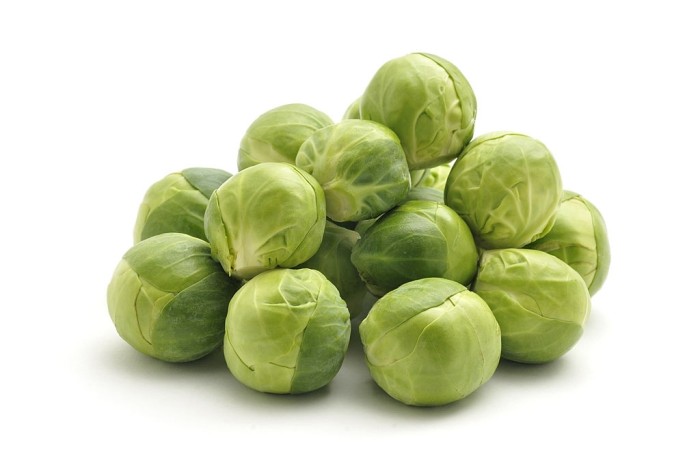
What other vegetables can dogs eat? Brussels sprouts are also included in this list as these are found to be excellent sources of vitamins C and K, as well as vitamins B1, B6, A, manganese, potassium, fiber, and folate. Depending on the size of your canine, one half to two sprouts is adequate for your pet. Choose Brussels sprouts that are still firm, green and lack a strong smell.
Wash the vegetables thoroughly then cut off stems while leaving enough stem for leaves to remain intact. Experts advise cutting a small X into the stem to allow its core to cook. After that, you can microwave the sprouts with some water for about 8 minutes. You can steam these for 5 minutes or even boil for around 10 minutes to have more crunch.
6. Spinach

Another safe vegetable for dogs is spinach. Some people worry that oxalates in this healthy vegetable can cause kidney issues in canine, but it does not affect them when given moderation. Spinach is a green leafy vegetable rich in Vitamin A, B, C, and K. It has nutritional benefits for both humans and dogs. It also contains fiber, iron, manganese, calcium, potassium, and folate. All these help boost your pet’s immune system, vitality, and energy levels. It can even help in the prevention of heart diseases and cancers.
Spinach has a strong flavor, so you might want to add it slowly into your dog’s diet. It can be served blandly cooked and mixed with your dog’s meals. Chop the leaves so that it is easy to chew and will not cause choking.
7. Lettuce

Lettuce is a safe vegetable if you want to add roughage and texture to your dog’s meals. It has little nutritional benefits that your pet can receive, but it does help with several canine health issues. There are many types of lettuce, and most of them can be shared with your pet.
Feeding lettuce to your pet can help lower their blood pressure and ease constipation. It has some vitamins and is rich in fiber, which gives it draining properties. If your pet has some digestive issues, add lettuce to their meals to grow good bacteria in their gut and boost their immune system.
You can serve lettuce raw or cooked for your canine buddy. But it will be easier for them to digest cooked leafy vegetables. Add it up in their homemade dog meal, steamed or finely chopped and sprinkled on top of their food.
MUST-READ: FRUITS FOR DOGS THAT THEY CAN AND CAN’T EAT
8. Celery
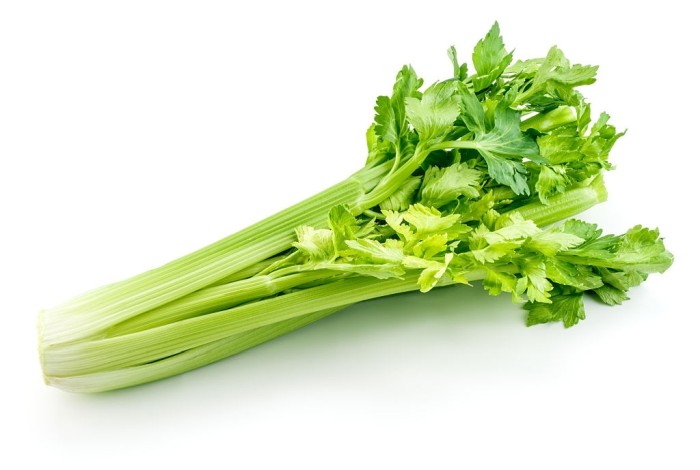
Celery is a delicious addition to our meals. It has plenty of fantastic benefits for dogs too. It is low in caloric value, plus plenty of vitamins, minerals, and nutrients favorable for your canine buddy. You can even find homemade dog recipes that include celery in its ingredients. But while the leaves are the most flavorful part of the plant and the most useful in cooking a stew, it is best to avoid giving them to your pooch.
This vegetable is susceptible to accumulating toxins and pesticides in its leaves, especially when it is not organically grown. There is much debate on how dangerous the celery leaves can be for canines, so try to tread carefully when it comes to your dog’s health.
The best part of celery to share with your canine buddies is the stalks. You can give them raw to enjoy its crunchiness but cut them into small chewable, and digestible pieces. Although safe for dogs, you should provide it in limited amounts only. Too much celery in your dog’s diet may lead to excessive urination.
9. Pumpkin

Another dog-friendly vegetable to give your pet is the Pumpkin! It is perfect for dogs, especially in treating several digestive issues. It is not only served when canines are suffering from constipation or diarrhea. Pumpkin can be given all year to purge intestinal worms and give your pooch a shiny, healthy coat.
This vegetable is rich in Vitamins A, C, E, iron, and potassium. It has soluble fibers that help regulate your dog’s bowel. It is also delicious; that’s why dogs love the taste of canned or pureed pumpkin.
Pumpkins should be cooked, mashed, or pureed before serving to your pets. You can replace your pet’s regular meals with this vegetable when they are constipated or have diarrhea. It is also a great alternative food for weight management in canines.
10. Green Beans
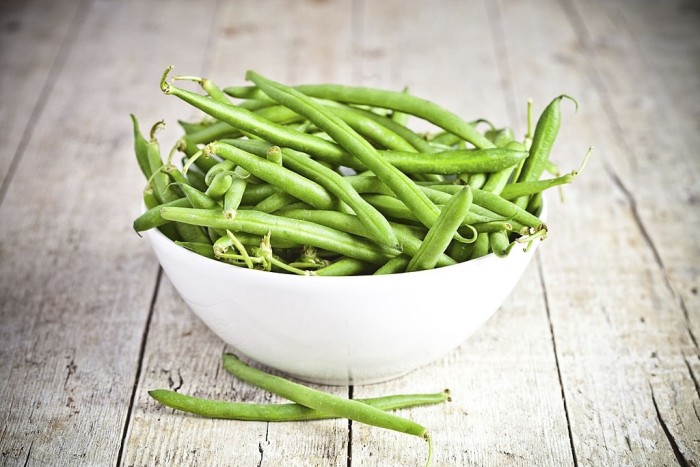
If your dog is carrying extra weight, consider replacing up to five percent of their food with low-calorie green beans. These beans are high in fiber content to help regulate bowel and aid digestion. These also contain heart-healthy omega 3s and are known to be a great source of vitamins A, C, K, and fiber and manganese. To prepare green beans for your dogs, wash them thoroughly, and cut their ends.
Use a covered pot for cooking green beans in boiling water for about ten minutes. Serve once cooled. You may also cook green beans, chicken in chicken broth, and brown rice to help your dog with an upset tummy.
11. Parsley

Parsley is a perfect breath-freshener for your canine buddy. These are also excellent sources of potassium for joint and muscle health and beta carotene for the eyes. Add a sprinkle of chopped parsley to your pet’s meal to banish his awful dog breath.
When it comes to parsley for dogs, you should only feed the curly variety. Watch those serving sizes, as parsley does contain a toxic compound called furanocoumarin, which can be dangerous in excessive amounts. In smaller servings, however, parsley does your dog more good than harm.
12. Squash Varieties
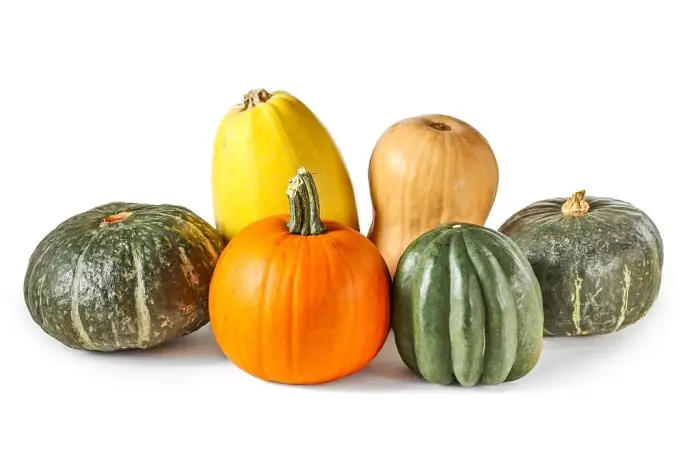
Just like pumpkins, squash is a great vegetable that you can give your pets. It is best enjoyed cooked, mashed and pureed. Many dogs love its delicious taste, and like other vegetables, it contains Vitamins A, C, potassium, and fiber. These vitamins and minerals support your pet’s healthy immune system, vision, colon, muscles, and others.
It is also rich in fiber; thus, it aids digestion, especially when experiencing diarrhea. This vegetable can be served plain and cooked. Raw is not toxic, but it can be hard for them to digest it. Give squash as a snack or mixed with their usual meals, but avoid adding seasonings and herbs.
13. Zucchini
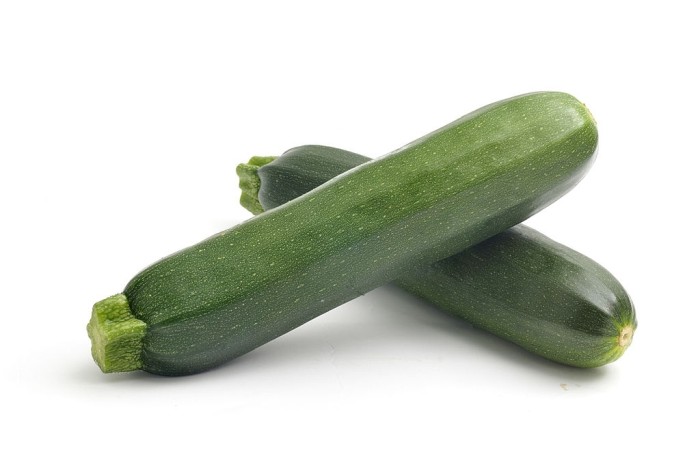
Zucchini is another low-calorie vegetable that is an excellent treat for dogs. Like any other veggie, it is perfectly safe to share bites with your pets, but you have to observe moderation too. Zucchini is an excellent source of Vitamin C and Potassium, which are valuable nutrients in keeping canines healthy.
Even if your pet does not lack nutrition, this veggie makes a great treat alternative. It will not crowd your pet’s regular protein-rich diet if you give it as an occasional treat. If your dog is on the heavy side, this food will keep them feeling full, leaner, and healthier.
14. Kale

Kale is not just a superfood for humans. It packs numerous benefits, including fighting arthritis, heart disease, urinary tract problems, and allergies. Given in small quantities, it is a safe and healthy treat for your dog. Additionally, it contains rich amounts of Vitamin C, K, Calcium, Beta-Carotene, Potassium, and Magnesium. All these support your pet’s healthy eyesight, muscles, blood, liver, immune system, and more.
Serve this to your dog cooked as raw kale can cause an upset stomach in canines. It is an excellent addition to your pet’s homemade meals or as an occasional treat. Additionally, serve it in moderation to avoid bloating or gas problems.
15. Peas
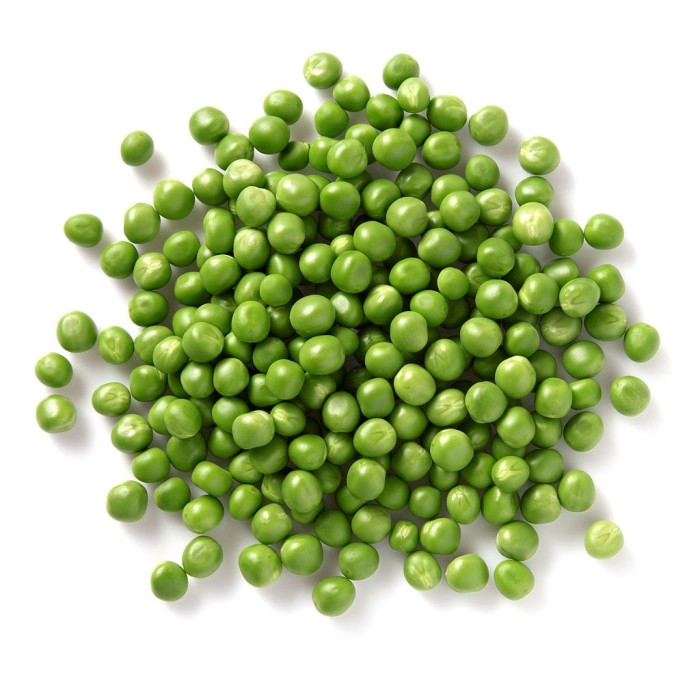
Typically, fresh peas are available as sugar snap or English peas. Make sure you shell them out before cooking. Sugar and snow snap pea’s shells are edible. You may grill snow and sugar snap peas for about three minutes on every side and coat them with olive oil if you have.
For the English peas, you have to shell them first before cooking them in boiling water for 2-4 minutes until they turn bright green. Then, drain and serve them to your pooch.
Peas are a good source of vitamin C and K. Good source of fiber, manganese, folate, protein, phosphorus, magnesium, iron, copper, potassium, zinc, and vitamins A, B1, B2, B3, and B6.
16. Sweet potato
Pureed or cooked mashed sweet potato is a tasty and healthy treat that fills their tummy and improves their system with minerals, fiber, and vitamins. Avoid serving them whole potatoes as it can choke them. You may cut this into wedges before giving them to your dog. Replace up to ¼ of the regular food of your dog with mashed sweet potatoes to change up her routine while improving her health simultaneously.
Sweet potatoes make a good chew once you dehydrate them. Cut these lengthwise into ¼” thickness. You may also feed your dog mashed sweet potatoes. For you to prepare, wash, and peel the potatoes. Cut them into quarters and put them into boiling water in a big pot. Simmer for about twenty minutes. Test the potatoes with a fork. Once they’re fully tender, remove from the pan and place them in a heat resistant container and mash using the potato masher. The benefits of sweet potatoes include vitamins C, B5, B6, fiber, potassium, and manganese.
17. Edamame
Edamame is a type of legume that is typically found in the frozen section of the supermarket. It is rich in Omega-3, Vitamin C, and calcium. Given in moderation and small amounts, it is a delightful protein-packed treat that your dogs will enjoy.
This vegetable can aid in the weight management of canines with obesity and diabetes problems. For instance, it also contains copper, phosphorus, iron, potassium, Vitamin K, and many others. All these contribute to your dog’s healthy and shiny coat, eyesight, and overall well-being.
You can serve edamame raw or cooked, or as a frozen treat. It can also be steamed, prepared, and mixed with their regular meal. Observe moderation in giving this to your dog and avoid adding salt or seasonings to it.
18. Bok Choy
Bok Choy is a kind of Chinese Cabbage. It has thick green or white stems that are filled with water. It also has green leafy tops. It is another low-calorie vegetable that is rich in vitamins and nutrients. It has Vitamin A, C, K, and potassium, which are essential for your dog’s diet. It can help your pooch develop healthier teeth and stronger bones. The nutrients found in this vegetable is also suitable for protecting the heart and against canine carcinoma.
But while Bok Choy is safe and great for your canine, it should be given in safe pieces and moderation. Be observant of potential reactions after introducing new veggies to your pooch.
You can serve this nutrient-dense veggie, raw or cooked. Simply remove the white stem portion and cut the leaves into smaller pieces to avoid choking. It can be mixed with their regular meals, but only in limited amounts.
19. Cabbage
Cabbage and its varieties are antioxidant-rich vegetables that are safe for dogs. It is an excellent source of fiber, Vitamin C, and K. It helps canine digestion, it is excellent for their skin and coat, and it also fights cancer.
On the other hand, giving too much cabbage to your pet can lead to gas. If you will give this raw, make sure it is only in small quantities. It is best to chop and cook it first to deactivate the natural compound, which can affect your canine’s thyroid gland.
20. Rutabagas and Turnips
Last but not least on our list is the rutabagas and turnips. These vegetables contain abundant amounts of folate and calcium. They are also low in calories, so they are ideal tasty treats for your dogs.
Turnips have Vitamin C, magnesium, and Vitamin B. All these aid in metabolism and better kidney functions and a healthy nervous system. On the other hand, canines with thyroid issues should not be given turnips to suppress thyroid functions.
These vegetables can be served occasionally to avoid digestive issues due to overeating turnips. Your pet can enjoy turnips and rutabagas raw when it is finely chopped and added into their meal. It can also be cooked, mashed, and mixed with their regular diet.
Wrap Up
Adding a variety of dog-friendly vegetables to your pet’s diet has a wide range of health benefits. Veggies can help boost your dog’s immune system, give them a healthier and shinier coat, and improve their oral health. Knowing and choosing the best veggies for dogs can significantly improve their quality of life.
However, it would be best if you were cautious in adding new ingredients to your pet’s diet. Quickly introducing fresh foods can lead to digestive issues. If you plan to give them vegetables, do so slowly and monitor them for problems or changes.
Try to add one vegetable at a time and wait for a few days before introducing a new one. This way, you can check out the reactions on one vegetable before giving them new food. Giving them plenty of new items to try is bad for their digestive system, but it will also be harder to determine which food item caused any adverse reaction. We hope our list helps you create a great food variety for your pets.
Have you tried giving any of these vegetables to your dogs? How was their reaction? Tell us about your experience by leaving us a comment in the box below!
MORE GUIDE

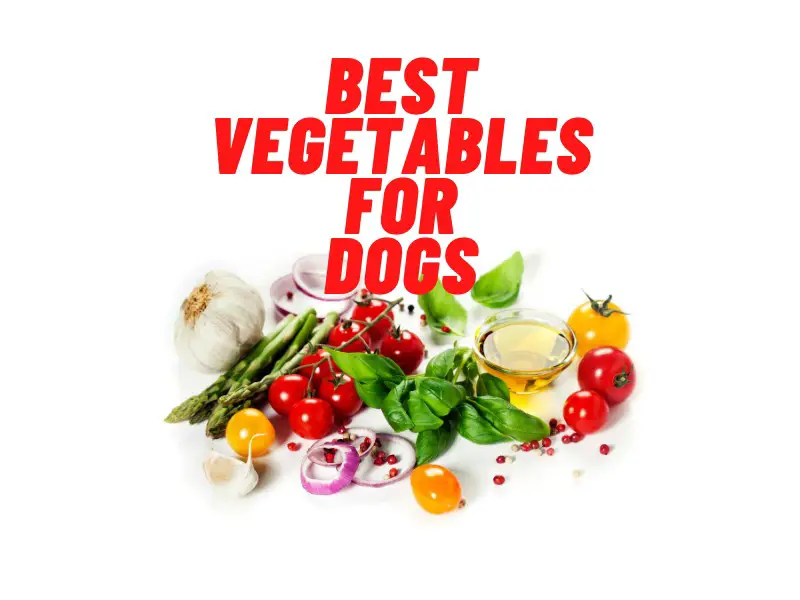
This is so informative thank you
Really very helpful .my 7 month old only eats table food so i try to fix the best for him to keep him healthy. Thank you very much
I’m pretty sure kale is toxic to dogs. According to the AKC Kale contains several potentially harmful natural compounds, including calcium oxalate and isothiocyanates.
Seriously? You peel, de-seed, cook, and SEASON cucumber for your dogs? My dogs BEG for raw cucumber (with the skin and seeds still on, even!). They come running when they hear me chopping it for a salad.
And even though this is about vegetables, you really should include a warning about grapes/raisins, given their little-known extreme, often fatal toxicity to dogs.
green tomatoes are pure poison for a dog…Pure red only
I cook a couple stalks of kale into my fur kids raw food every time I make a batch. All 4 have been eating it for years with no issues.
Thank you so much for this. Can you please do another article ( or amend this one to include vines or raw plants for us gardeners with fourlegged friends ) Like I hear tomatoes in moderation but NO VINES near dogs, I understand they are of the nightshade family and toxic. It’s hard to find info on this topic too.
Thank you soo much for all you do!!!
#howwwll